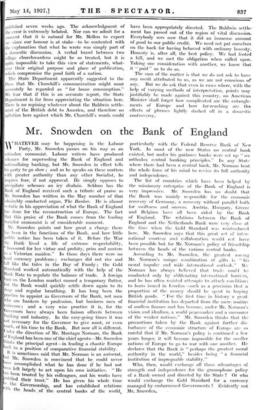Mr. Snowden on the Bank of England
WHATEVER may be happening in the LabourParty, Mr. Snowden passes on his way as an orthodox economist. Labour writers have produced schemes for superseding the Bank of England and nationalizing banking, but Mr. Snowden in effect tells his party to go slow ; and as he speaks on these matters with greater authority than any other Socialist, he inspires fear, if not approval. He simply opposes to precipitate schemes an icy disdain. Seldom has the lank of England received such a tribute of praise as Ir. Snowden has written in the May number of that admirably conducted organ, The Banker. He is almost ecstatic in his appreciation of what the Bank of England las done for the reconstruction of Europe. The fact that this praise of the Bank comes from the leading socialist economist is of considerable moment.
Mr. Snowden points out how great a change there has been in the functions of the Bank, and how little mblic notice has been taken of it. Before the War the Bank lived a life of extreme respectability, • humnired for her virtue and probity, prim and austere s a Victorian maiden." In those days there were no lard currency problems ; exchanges did not rise and all like the tides in the Bay of Fundy ; the Gold [Ward worked automatically with the help of the tank Rate to regulate the balance of trade. A foreign ian on the London market caused a temporary flutter, ut the Bank would quickly settle down again to its cep and regular breathing. It has long been the ractice to appoint as Governors of the Bank, not men rho are bankers by profession, but :business men of thinence ; and a very wise practice it is, for the overnors have always been liaison officers between tanking and industry. In the easy-going times it was ot necessary for the Governor to giVe most, or even melt, of his time to the Bank, But now all is different. nder the direction of Mr. Montagu Norman, the Bank f England has been One-of the-chief agents—Mr. Snowden links the principal agent—in leading a chaotic Europe aek to a position of comparative financial stability. It is Sometimes said that Mr. Norman is an autocrat; ut Mr. Snowden is convinced that he could never uwe accomplished .what he has done if he had not en left largely to act upon his own initiative. " He as been trusted by his colleagues, and his works have ustified their trust." He has given his whole time 0 the .GOvernorship, and has established relations th the heads of the central banks of the world, particularly with the Federal Reserve Bank of New York. In most of the new States no central bank existed, but under his guidance banks were set up " on orthodox central banking principles." In any State where there had been a central bank, Mr. Norman bent the whole force of his mind to revive its full authority and independence.
The list of countries which have been helped by the missionary enterprise of the Bank of England is very impressive. Mr. Snowden has no doubt that the Bank was mainly responsible for the economic recovery of Germany, a recovery without parallel both for swiftness and success. Austria, Hungary, Greece and Belgium have all been aided by the Bank of England. The relations between the Bank of England and the Netherlands Bank were very close at the time when the Gold Standard was reintroduced here. Mr. Snowden says that this great act of inter- national courtesy and collaboration would not have been possible but for Mr. Norman's policy of friendship between the heads of the various central banks.
According to Mr. Snowden, the greatest among Mr. Norman's unique combination of gifts is " his moral impulse and wide international outlook." Mr.
Norman has always believed that trade could b.: conducted only by obliterating international barriers, and he has often resisted attempts to .attach condition to loans issued in London—such as a provision that a proportion of the money should be spent in buying British goods. " For the first time in history a great financial institution has departed from the mere routine of soulless finance and has become, under Mr. Norman's vision and idealism, a world peacemaker and a succourer of the weaker nations:" Mr. Snowden thinks that the precautions taken by the Bank against further dis- turbance of the economic structure of Europe arc so Careful that if Mr.- Norman's policy is continued a few years longer, it will become impossible for the smaller nations of Europe to go to war with one another. He declares that the Bank is " perhaps the greatest moral authority in the world," besides being " a financial institution of impregnable stability."
Who, then, would exchange all those advantages of strength and independence for the gramophone policy of a Bank owned and directed by the State ? Or who would exchange the Gold Standard for a currency managed by embarrassed Governments ? Evidently not Mr. Snowden. •


























































 Previous page
Previous page